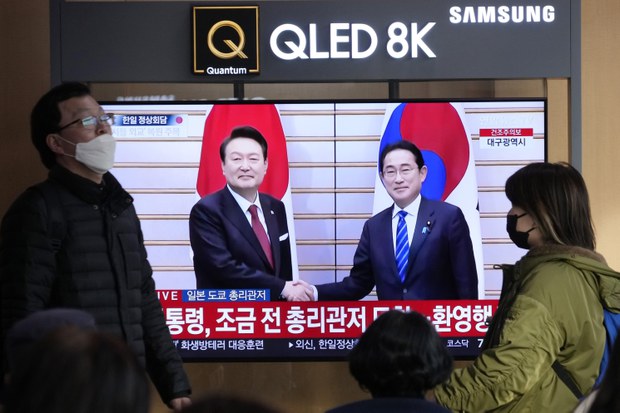Seoul, Tokyo to resume financial talks amid geopolitical risks
Share

People pass by a TV screen showing South Korean President Yoon Suk Yeol, left, meeting with Japanese Prime Minister Fumio Kishida in Japan, during a news program at the Seoul Railway Station in Seoul, South Korea, March 16, 2023.
South Korea and Japan are set to revive their financial cooperation in the face of heightened geopolitical risks – a move indicating that the bilateral collaboration is extending beyond the military realm.
South Korea’s Financial Services Commission Chairman Kim Joo-hyun and Japan’s Governor of the Financial Services Agency Teruhisa Kurita met in Tokyo Tuesday and agreed to resume the regular bilateral meeting that had been suspended since 2016.
During the meeting, the two authorities shared experiences on financial services digitalization, agreeing to further discussion on this front going forward. They also discussed ways to strengthen measures to foster financial stability.
Both sides will hold their first formal bilateral meeting of financial authorities in seven years this December in the South Korean capital, according to a joint statement by Seoul and Tokyo.
Tuesday’s meeting is a sign that the relations between the two key U.S. allies are on the mend, with cooperation now extending into the financial sector.
The two have been in dispute over various issues, predominantly on history during Japan’s colonial rule over the Korean peninsula. Most notable is the issue of compensating forced laborers and ‘comfort women,’ a Japanese euphemism for wartime sex slaves. As the dispute showed no signs of reaching a resolution, its implication has extended to other areas, affecting military and economic security.
The discord between Tokyo and Seoul ran against the U.S. President Joe Biden’s mission to unite allies in addressing regional challenges, particularly those posed by China. South Korea’s conservative President Yoon Suk Yeol, who took office last year, made steps to reconcile the dispute, and had proposed measures to compensate the wartime victims using South Korean funds, despite the domestic backlash.
Initial indications of reconciliation appeared in the military sector, with the navies of South Korea and Japan actively and openly participating in drills in waters that divide the Koreas and Japan.
China risks
The latest bilateral financial cooperation is taking place as both nations strive to counteract potential financial risks arising from China’s real estate sector. The instability of the Chinese property market, a significant component of its economy, has heightened concerns about the country’s shadow banking system. Shadow banks, which operate outside the formal banking sector, are particularly vulnerable to property market downturns as they often fund developers who are not qualified for traditional bank loans.
The risks have stacked up as indebted developers struggle to repay their creditors and investors, raising fears of a wider financial destabilization. Such disruptions may impact global financial systems, which means that major U.S. allies like South Korea and Japan could be indirectly affected.
Financial collaboration is also expected to mutually benefit both Tokyo and Seoul, on their own terms. While Japan faces hurdles in its shift to a digital finance platform, South Korea’s expertise in this domain could expedite Japan’s transition.
South Korea has also been focusing on stabilizing its financial environment, as reflected by the fluctuations in its Financial Vulnerability Index, a barometer that gauges financial risk.
According to a Bank of Korea report released last week, the index increased by 0.3 percentage points in the second quarter, reaching 43.6. This figure suggests that Seoul may seek to collaborate with relevant authorities to address potential risks. In June, Seoul and Tokyo reached an agreement on a US$10 billion currency swap deal.
Edited by Elaine Chan and Mike Firn.







